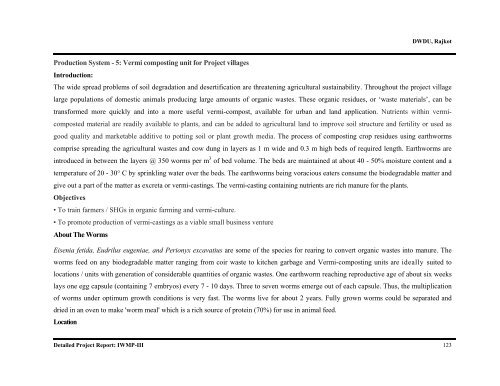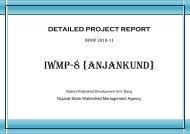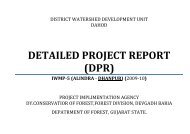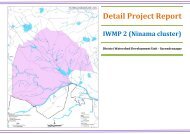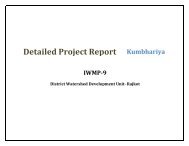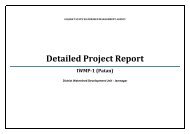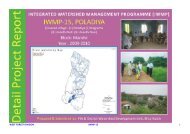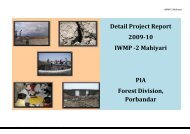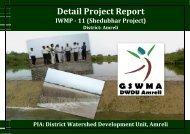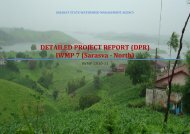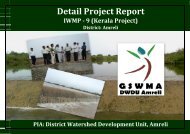IWMP-3 - Commissionerate of Rural Development Gujarat State ...
IWMP-3 - Commissionerate of Rural Development Gujarat State ...
IWMP-3 - Commissionerate of Rural Development Gujarat State ...
You also want an ePaper? Increase the reach of your titles
YUMPU automatically turns print PDFs into web optimized ePapers that Google loves.
DWDU, Rajkot<br />
Production System - 5: Vermi composting unit for Project villages<br />
Introduction:<br />
The wide spread problems <strong>of</strong> soil degradation and desertification are threatening agricultural sustainability. Throughout the project village<br />
large populations <strong>of</strong> domestic animals producing large amounts <strong>of</strong> organic wastes. These organic residues, or ‘waste materials’, can be<br />
transformed more quickly and into a more useful vermi-compost, available for urban and land application. Nutrients within vermicomposted<br />
material are readily available to plants, and can be added to agricultural land to improve soil structure and fertility or used as<br />
good quality and marketable additive to potting soil or plant growth media. The process <strong>of</strong> composting crop residues using earthworms<br />
comprise spreading the agricultural wastes and cow dung in layers as 1 m wide and 0.3 m high beds <strong>of</strong> required length. Earthworms are<br />
introduced in between the layers @ 350 worms per m 3 <strong>of</strong> bed volume. The beds are maintained at about 40 - 50% moisture content and a<br />
temperature <strong>of</strong> 20 - 30° C by sprinkling water over the beds. The earthworms being voracious eaters consume the biodegradable matter and<br />
give out a part <strong>of</strong> the matter as excreta or vermi-castings. The vermi-casting containing nutrients are rich manure for the plants.<br />
Objectives<br />
• To train farmers / SHGs in organic farming and vermi-culture.<br />
• To promote production <strong>of</strong> vermi-castings as a viable small business venture<br />
About The Worms<br />
Eisenia fetida, Eudrilus eugeniae, and Perionyx excavatius are some <strong>of</strong> the species for rearing to convert organic wastes into manure. The<br />
worms feed on any biodegradable matter ranging from coir waste to kitchen garbage and Vermi-composting units are ideally suited to<br />
locations / units with generation <strong>of</strong> considerable quantities <strong>of</strong> organic wastes. One earthworm reaching reproductive age <strong>of</strong> about six weeks<br />
lays one egg capsule (containing 7 embryos) every 7 - 10 days. Three to seven worms emerge out <strong>of</strong> each capsule. Thus, the multiplication<br />
<strong>of</strong> worms under optimum growth conditions is very fast. The worms live for about 2 years. Fully grown worms could be separated and<br />
dried in an oven to make 'worm meal' which is a rich source <strong>of</strong> protein (70%) for use in animal feed.<br />
Location<br />
Detailed Project Report: <strong>IWMP</strong>-III 123


